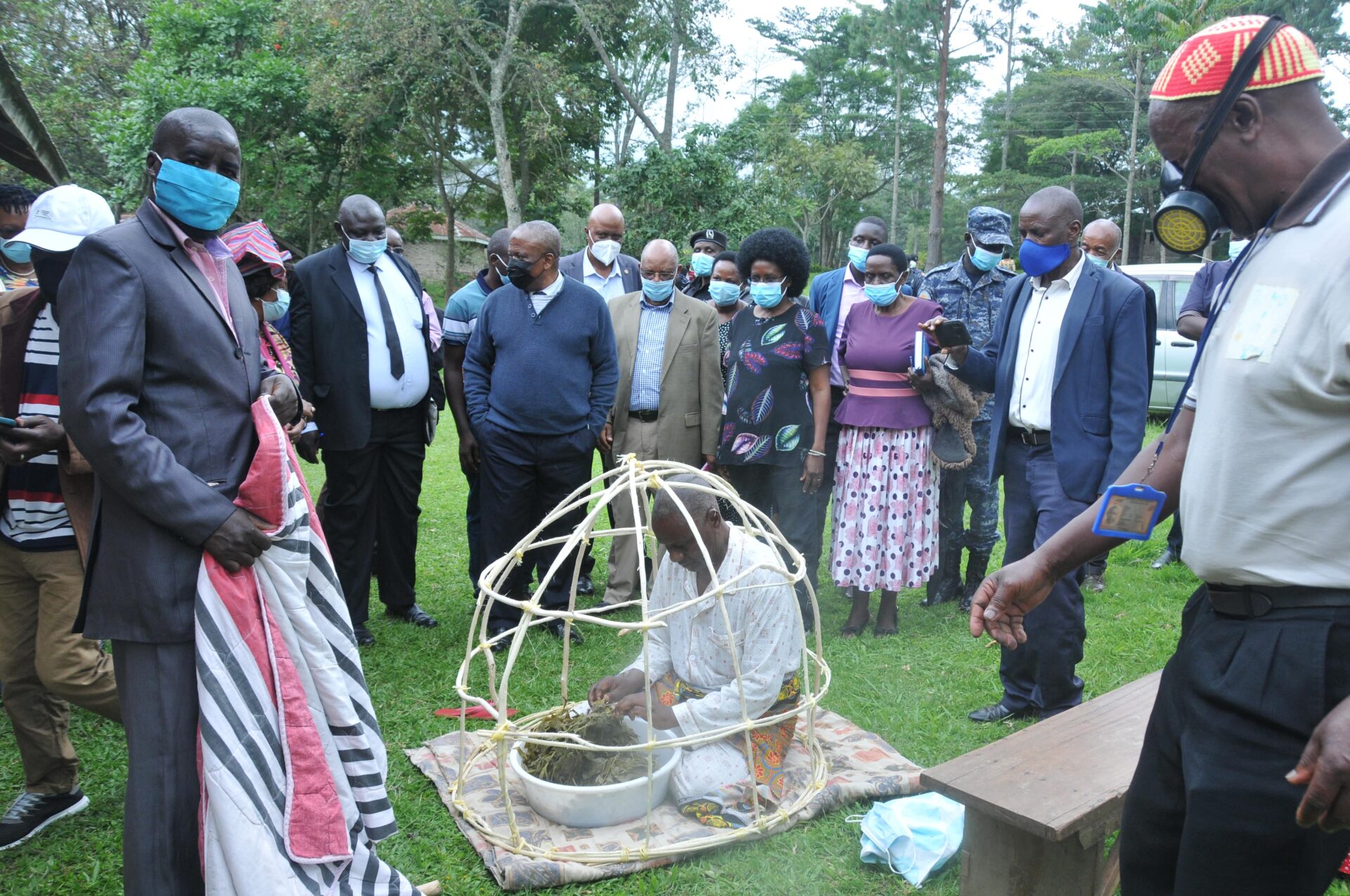Photo: Herbalists at Rukararwe showing the World Health Organisation (WHO) team and the Minister for Science and Technology Dr Monica Musenero the local process of steaming using herbs which they said helped people to manage the COVID-19 pandemic.
Governments and nations have been warned to use the COVID-19 pandemic as a learning lesson and put in place means of developing indigenous knowledge.
According to Prof Joseph Okeibunor the WHO/AFRO team leader on Research and Development, with COVID-19, the World transitioned to a new level where every human being had to stand on his/her own.
“At some point, all nations were put under lockdown, airports were brought down and there were no exports nor imports,” he said. “Our big men could not be flown out to go and get medication abroad,” Okeibunor stressed.
Okeibunor was leading a team of experts from WHO who visited herbalists of the Bushenyi region at Rukararwe Partnership workshop for rural development. The team visited the centre to see what the herbalists are doing, discuss with herbalists what they go through, to see the best practices they use, their strength and their weaknesses.
The delegation has been in the country visiting a number of health institutions including herbalists. Okeibunor explained that WHO, the Centre for Disease Control (CDC) and the African Commission for social welfare decided to come together and put in place a team of experts/professionals in different fields to study traditional medicine at different institutions.
“During COVID-19, each had to rely on their own environment to treat themselves since there was no import,” Okeibunor explained.
“We have to look at our indigenous knowledge. The herbalists have always been there even before the English medicines were introduced,” he said.
He noted that “with COVID-19, herbalists have been brought into the limelight for us to realize what they can do to help our people.”
The Minister for Science and Technology and Innovations Dr Monica Musenero briefed WHO about how government under the Presidential Scientific Initiative has already committed itself to supporting the entire process of the value addition chain.
“Resources including raw materials are in place and what we need is to organize ourselves,” she said. Musenero disclosed how a clinical team has already been assembled to run the process. “We want scientists to listen to herbalists and translate the knowledge,” Musenero said.
“My ambition is to create and complete the cycle of value addition chain/manufacturing because that is when our medicines will get transformed from a crude way to be respected worldwide,” the minister said.
She appealed to WHO to support the government of Uganda in this value addition chain. “We want to be able to produce medicines which are respected even in London and that is why we have invited WHO as we move to manufacture,” Musenero explained.
“It is important to do what you are doing in compliance with scientific details with standard operating procedures,” advised Prof. Motlalepula Matsabisa, a WHO delegate.
Earlier the Rukararwe Board of Trustees chairperson Johnson Bitarabeho said the herbalists’ efforts to produce medicines are hampered by a lack of appropriate technologies like; driers, preserving technologies, extractors and grinding machines, storage facilities, weighing and measuring equipment, packaging materials and machines, branding among others.
He said in collaboration with government agencies like National Drugs Authority (NDA) and their partners in Germany they have continued to empower, support and train traditional herbalists to improve on the quality of the herbal medicine.
“Despite our efforts to bring herbalists together, many of them are still using rudimentary means to extract medicine. If we could be supported with appropriate technologies we would take traditional herbal medicine to another level,” Bitarabeho said.
Prof. Motlalepula Matsabisa, a professor of pharmacology faculty of health sciences at the University of Free State in South Africa said, “I have seen the ambition. And how do we harness the ambition?” he wondered adding that, “making medicine is what I have seen here and supporting value addition is what is necessary.” Matsabisa said 90% of medicines come from herbs. “If they are made from herbs the question we should all ask ourselves is what has Africa contributed to that?”
He urged African governments to help people to move away from self sustaining and go into manufacturing to support the economy.
The Presidential Advisor on Public relations Mary Karooro Okurut told the WHO team that Uganda will succeed in herbal medicine manufacturing because President Yoweri Museveni is in full support of all the initiatives.
“Our herbalists are already somewhere and what they require is support,” Karooro observed.

